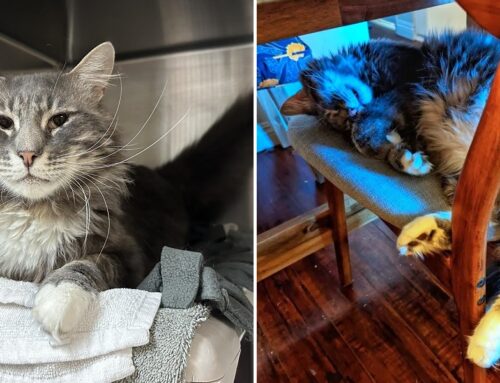Cat scratch fever: It’s not just an old Ted Nugent song but a bacterial infection from cat scratches, particularly those from kittens. According to the CDC, most cases happen in the fall and winter in kids under 15 years old. Also, cases may be more common in the South, where heat and moisture-loving fleas are more common.
Notably, cat scratch fever can also occur in dogs, rodents, and many other mammals. However, it’s less common in dogs.
When cats scratch, the bacteria from flea feces can enter the skin.

Flea by Josef Reischig via Wikimedia Commons, CC BY SA 3.0
Most Cases Don’t Require Treatment
The good news is most cases don’t require treatment for either pets or people. Most cats, kittens, and people will fight off the Bartonella henselae bacteria which causes the disease. According to studies, as many as 1/3 of healthy cats have Bartonella in their blood. However, it’s unnecessary to test or treat healthy cats for Bartonella.
Don’t Declaw Your Cat
Importantly, the CDC does NOT recommend declawing cats to prevent cat scratch fever. There’s no evidence it decreases the risk of transmitting the bacteria to humans. On the other hand, it’s a good idea to keep the cat’s nails trimmed.
However, since the bacteria can be transmitted through fleabites and catfights, treating fleas is essential. And, it’s another good reason to keep your cat indoors.
Do People Need Treatment for Cat Scratch Fever?
Playful kittens and cats sometimes scatch, and it’s always a good idea to wash the scratch with soap and water. Also, if you have a scratch or open wound, don’t let your cat or kitten lick the area.
Occasionally, 1-3 weeks later, you may see symptoms like a bump or blister at the scratch area, fever, fatigue, headache, and enlarged tender lymph nodes. In such cases, see your doctor, who will decide if you need antibiotics.
More good news: People who have had the infection usually do not get it again.

Featured image: Cat by JACLOU-DL via Pixabay, Pixabay License
What if You Have a Medical Condition?
For those with a health condition that could weaken the immune system, you don’t have to give away your cat. Instead, the CDC has some common-sense suggestions. For example, be sure to wash the scratch or bite with soap and water.
If you are interested in getting a feline companion, consider a healthy older cat, at least one year old. As common sense suggests, avoid cats with flea infestations, generally more likely in stray cats.
Remember, cats and kittens are exposed to Bartonella bacteria from flea bites, fights with other cats, and feline blood transfusions. So, keeping cats indoors and using flea control as recommended by your veterinarian can help prevent exposure.
Rough and Tumble Kitten Antics
Although we all love rough and tumble kitten antics, they can result in usually harmless cat scratches. Where possible, try to avoid scratches, particularly if the cat hasn’t been treated for fleas or you have a medical condition. However, do love your cat and kitten to the fullest and enjoy their wonderful companionship.

Kittens by Olgaozik via Pixabay, Pixabay License
Treating Cats (and Sometimes Dogs)
Sometimes, cats or kittens will become sick enough to require veterinary care. Like symptoms in people, cats or kittens may have a fever, vomiting, red eyes, swollen lymph nodes, and decreased appetite.
As noted, most cats and kittens will recover on their own, but if symptoms persist, seek veterinary care. Likewise, dogs may show similar symptoms requiring veterinary care.
Rare Serious Illness
Rarely, cat scratch fever can be serious and even deadly, affecting the brain and heart. Generally, serious illness occurs in those who are immunocompromised. In recent years, cases of people becoming seriously ill with cat scratch fever have risen, even as the numbers of overall infections decreased. Possibly, it’s related to the larger number of people living with suppressed immune systems today.
A 2016 large-scale evaluation of the illness in the United States found that around 500 people could be sick enough to be hospitalized each year. As many as 12,000 may be diagnosed with cat scratch disease annually.
See more from WNCT-TV 9 On Your Side:
Featured image: kitten photo by florianhoellmueller via Pixabay, Pixabay License












